 Pray the Scriptures Bible: Psalms and Proverbs Prayers 2011 Kevin Johnson Gods Word 1995 by Gods Word to the Nations Used by permission of Baker Publishing Group. All rights reserved. E-book edition created 2011 Published by Bethany House Publishers 11400 Hampshire Avenue South Minneapolis, Minnesota 55438 www.bethanyhouse.com Bethany House Publishers is a division of Baker Publishing Group, Grand Rapids, Michigan All rights reserved. No part of this publication may be reproduced, stored in a retrieval system, or transmitted in any form or by any meansfor example, electronic, photocopy, recordingwithout prior written permission of the publisher. The only exception is brief quotations in printed reviews. ISBN 978-0-7642-0859-1 Up to 500 Scripture verses may be quoted in any form (printed, written, visual, electronic, or audio) without written permission, provided that no more than half of any one book of the Bible is quoted, and the verses quoted do not amount to 25 percent of the text of the product in which they are quoted.
Pray the Scriptures Bible: Psalms and Proverbs Prayers 2011 Kevin Johnson Gods Word 1995 by Gods Word to the Nations Used by permission of Baker Publishing Group. All rights reserved. E-book edition created 2011 Published by Bethany House Publishers 11400 Hampshire Avenue South Minneapolis, Minnesota 55438 www.bethanyhouse.com Bethany House Publishers is a division of Baker Publishing Group, Grand Rapids, Michigan All rights reserved. No part of this publication may be reproduced, stored in a retrieval system, or transmitted in any form or by any meansfor example, electronic, photocopy, recordingwithout prior written permission of the publisher. The only exception is brief quotations in printed reviews. ISBN 978-0-7642-0859-1 Up to 500 Scripture verses may be quoted in any form (printed, written, visual, electronic, or audio) without written permission, provided that no more than half of any one book of the Bible is quoted, and the verses quoted do not amount to 25 percent of the text of the product in which they are quoted.
If the quotation is used in a product that is not for sale, the designationGWmust always appear following each quotation. If the quotation is used in a product that is for sale, the following copyright notice must be used: Scripture is taken from Gods Word , 1995 Gods Word to the Nations. Used by permission of Baker Publishing Group. For quotations over 500 verses and/or questions about these policies, please write to Baker Publishing Group, P.O. Box 6287, Grand Rapids MI 49516. You may also contact them through their website: www.bakerpublishinggroup.com .
Library of Congress Cataloging-in-Publication Data is available for this title. CONTENTS Preface G OD s W ORD Translation G OD s W ORD Translation (GW), produced by Gods Word to the Nations Mission Society, fills a need that has remained unmet by English Bibles: to translate the Bible from the Hebrew, Aramaic, and Greek texts to their closest natural English equivalent. GW consciously combines scholarly fidelity with natural English. Because it was translated by a committee of biblical scholars, GW is an accurate, trustworthy translation. Because of the involvement of English reviewers at every stage of the translation process, GW reads like contemporary literature. Closest Natural Equivalence Like many Bibles published before it, G OD s W ORD has been translated directly from the Hebrew, Aramaic, and Greek texts.
Unlike many Bibles before it, however, GW used a translation theory that reflects the advancement of translation theory and practice. Closest natural equivalent (CNE) translation provides readers with a meaning in the target language that is equivalent to that of the source language. It seeks to express that meaning naturally, in a way that a native English speaker would speak or write. Finally, it expresses the meaning with a style that preserves many of the characteristics of the source text. However, CNE does not attempt to make all books or passages function on the same level. The more difficult books of the Bible are translated to the same level of difficulty as the original languages.
In addition, abstract concepts in Greek and Hebrew are translated into abstract concepts in English, and concrete concepts remain concrete in translation. This translation theory is designed to avoid the awkwardness and inaccuracy associated with formal-equivalent translations, and to avoid the loss of meaning and oversimplification associated with functional-equivalent translations. Translation Process The first consideration for the translators of GW was to find equivalent English ways of expressing the meaning of the original text, ensuring that the translation is faithful to the meaning of the source text. The next consideration was readability; the meaning is expressed in natural English by using common English punctuation, capitalization, grammar, and vocabulary. The third consideration was to choose the natural equivalent that most closely reflects the style of the Hebrew, Aramaic, or Greek text. At the core of this effort was a full-time translation team composed of biblical scholars who served as translators, English experts who actively reviewed English style with scholars at every stage of the translation process, and professional production personnel who oversaw the work.
The basic process is outlined below. Translation In the first step of this process, a biblical scholar used the principles of closest natural equivalence to produce an initial translation of one of the books of the Bible. During this time, the translator was able to consult with the rest of the translation team as needed. English Review With the initial draft of a book completed, an expert in English style reviewed the translators text and suggested changes. The English reviewer was concerned primarily with a natural English rendering. Additionally, the English reviewer electronically searched the entire translation to ensure that any proposed revisions would not destroy the translations consistency.
The translator and the English reviewer then worked together to produce a second draft that improved both the naturalness and accuracy of the translation. Upon completion of the second draft, the translator and English reviewer served as resources for the rest of the editorial process. Peer Review After the English review process, the second draft was circulated to the other full-time translators and English reviewers for comments. This peer review stage allowed the other members of the translation team to compare the draft with their own work, offer suggestions for further improvement, and maintain consistency from one book of the Bible to another. Technical Review The translator and English reviewer incorporated all appropriate suggestions offered in the peer review stage to produce a third draft. This draft was then submitted to a number of scholarly technical reviewers, who submitted written suggestions for improvements in the translation.
Review by Book Editorial Committee The next step in the process produced a fourth draft of the text. Taking into account the comments of the technical reviewers, a book editorial committee met to read and discuss the text for each book of the Bible. The final step for the book editorial committee was reading the text aloud. Since the Bible is read not only silently but also aloud in worship and instructional settings, having a Bible translation that can be immediately grasped by the listener or reader and understood without the benefit of rereading was an important consideration. Review by Consultative Committee After the members of the book editorial committee finished their work, they passed the fourth draft to the members of the consultative committee. This group of more than fifty Christian leaders from various denominations submitted comments and suggestions.
Review by Old Testament, New Testament, and Bible Editorial Committees The final editorial changes were made when all the books of the Bible had been completed or were near completion. Old and New Testament committees and, finally, a Bible editorial committee approved the accuracy and readability of the text. Features of G OD s W ORD Layout The features that distinguish G OD s W ORD from other Bible translations are designed to aid readers. The most obvious of these is the open, single-column format. In prose, GW looks like other works of literature. It contains frequent paragraphing.
Whenever a different speakers words are quoted, a new paragraph begins. Lists, genealogies, and long prayers are formatted to help readers recognize the thought pattern of the text. The prose style of GW favors concise, clear sentences. While avoiding very long, complicated sentences, which characterize many English Bible translations, GW strives to vary the word arrangement in a natural way. Doing this enhances readability and brings the Scriptures to life. The books that are primarily poetry in GW are instantly recognized by their format.
Next page
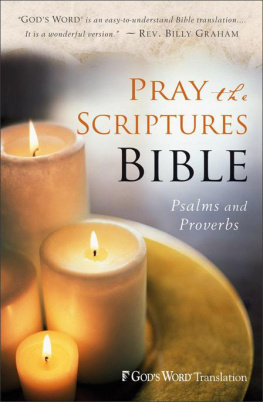
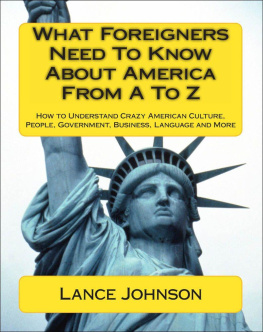



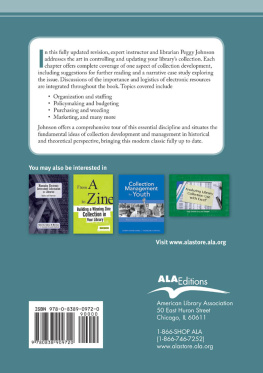



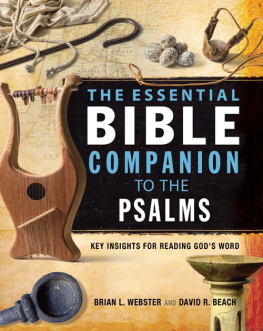
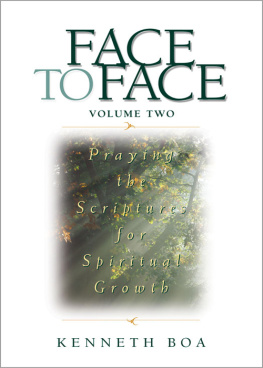
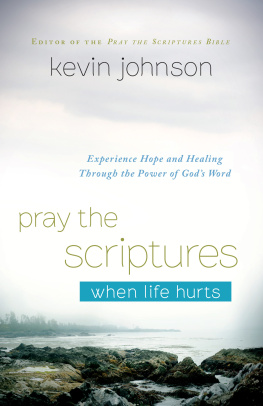
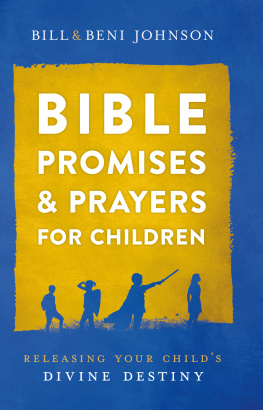

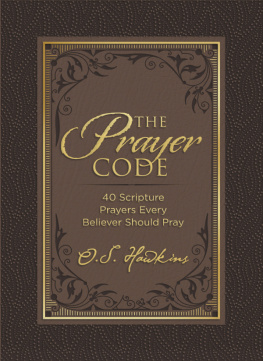
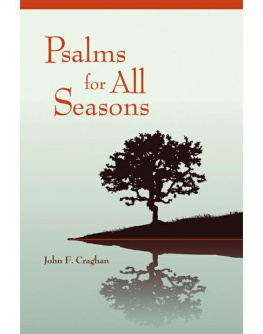
 Pray the Scriptures Bible: Psalms and Proverbs Prayers 2011 Kevin Johnson Gods Word 1995 by Gods Word to the Nations Used by permission of Baker Publishing Group. All rights reserved. E-book edition created 2011 Published by Bethany House Publishers 11400 Hampshire Avenue South Minneapolis, Minnesota 55438 www.bethanyhouse.com Bethany House Publishers is a division of Baker Publishing Group, Grand Rapids, Michigan All rights reserved. No part of this publication may be reproduced, stored in a retrieval system, or transmitted in any form or by any meansfor example, electronic, photocopy, recordingwithout prior written permission of the publisher. The only exception is brief quotations in printed reviews. ISBN 978-0-7642-0859-1 Up to 500 Scripture verses may be quoted in any form (printed, written, visual, electronic, or audio) without written permission, provided that no more than half of any one book of the Bible is quoted, and the verses quoted do not amount to 25 percent of the text of the product in which they are quoted.
Pray the Scriptures Bible: Psalms and Proverbs Prayers 2011 Kevin Johnson Gods Word 1995 by Gods Word to the Nations Used by permission of Baker Publishing Group. All rights reserved. E-book edition created 2011 Published by Bethany House Publishers 11400 Hampshire Avenue South Minneapolis, Minnesota 55438 www.bethanyhouse.com Bethany House Publishers is a division of Baker Publishing Group, Grand Rapids, Michigan All rights reserved. No part of this publication may be reproduced, stored in a retrieval system, or transmitted in any form or by any meansfor example, electronic, photocopy, recordingwithout prior written permission of the publisher. The only exception is brief quotations in printed reviews. ISBN 978-0-7642-0859-1 Up to 500 Scripture verses may be quoted in any form (printed, written, visual, electronic, or audio) without written permission, provided that no more than half of any one book of the Bible is quoted, and the verses quoted do not amount to 25 percent of the text of the product in which they are quoted.